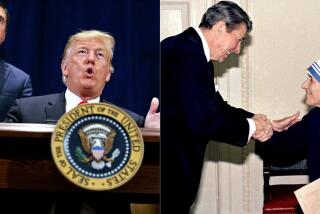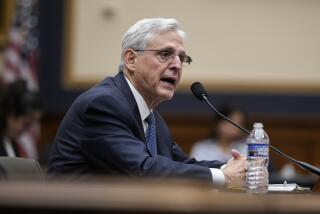Cheney Faults Reagan’s Iran-Contra Role
- Share via
WASHINGTON — President Reagan’s mishandling of the Iran- contra affair has jeopardized his aid program for the Nicaraguan rebels and guaranteed that he will spend the remainder of his presidency on the defensive on Central American policy, Rep. Dick Cheney (R-Wyo.) said Monday.
Cheney, ranking Republican on the House select committee investigating the scandal, called the Iran-contra affair “a case study in training the President and his staff on how not to conduct foreign policy.”
He faulted Reagan for his role in approving the sale of weapons to Iran in an arms-for-hostages operation and for not notifying Congress in advance about that project or the Administration’s covert plans to seek private aid for the contras during a congressional ban on U.S. government assistance to them.
Staunch Supporter
It was by far the strongest criticism yet leveled at Reagan by Cheney, who arguably has been the President’s staunchest defender on the House committee during two weeks of joint hearings with a Senate select committee. The hearings resume today.
Cheney, who served as White House chief of staff during the Gerald R. Ford Administration, criticized the way policy was conducted in the White House in 1985 and 1986 and, in answer to a question, said that former Chief of Staff Donald T. Regan was “responsible.”
Regan, who was replaced as chief of staff by former Republican Sen. Howard H. Baker Jr. on Feb. 27, already has testified in closed session in the congressional investigation and, Cheney said, probably will be called to testify publicly at the hearings.
However, although the scandal “will take some gloss” off Reagan’s presidency, Cheney said that he sees no evidence of law violations by the President and believes that he will leave the Oval Office “in fairly good shape” when his term ends in January, 1989.
Polls Show Drop in Ratings
Reagan’s ratings in public opinion polls dropped sharply after the scandal surfaced last November, with a majority of Americans saying consistently that they did not believe he had told the truth about his own role. His public approval rating in polls in recent weeks has hovered near 50%.
Cheney said he believes that Reagan “has reached a plateau” in public opinion polls that is not likely to change, “no matter what comes out of the hearings.”
People generally “have made up their minds and think the President screwed up, but they want to get on” with the hearings and believe that Congress is dragging them out, Cheney said.
Although the hearings have generated tremendous interest in Washington and dominated the agenda of Congress and the press here, Cheney said he has found that they are attracting much less interest in other parts of the country.
Sees Interest Picking Up
But he said that he expects national interest to pick up about mid-June, when the committees are expected to begin hearing testimony from three crucial witnesses: Rear Adm. John M. Poindexter, Reagan’s former national security adviser; Lt. Col. Oliver L. North, a fired Poindexter aide, and Fawn Hall, North’s secretary.
At the rate the hearings have been proceeding, Cheney said, they should be completed by the end of July. The legislation creating the Senate committee calls for it to wind up its business by Aug. 30, while the House committee can operate until Oct. 30. The committees have not decided whether to issue a joint report or separate reports.
More to Read
Sign up for Essential California
The most important California stories and recommendations in your inbox every morning.
You may occasionally receive promotional content from the Los Angeles Times.













